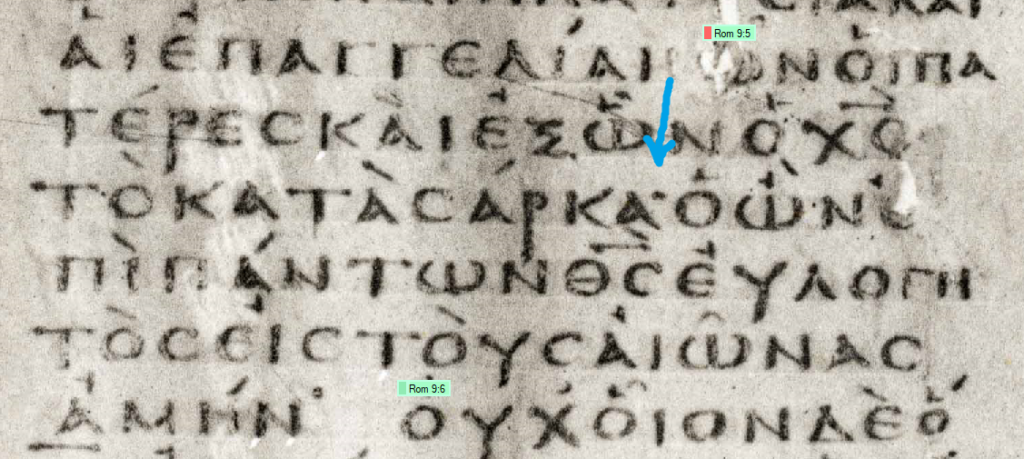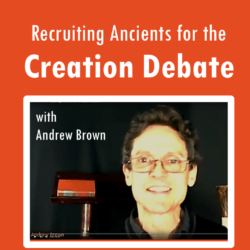We continue our refutation of Michael Brown’s opening statement by addressing a whole smattering of texts, including Isaiah 9.6, John 20.28, Colossians 2.9, 2 Peter 1.1, Romans 9.5, and 1 John 5.20. We explain and debunk Brown’s unusual singular verb argument from 1 Thess 3.13, 2 Thess 2.16-17, and Rev 22.3-4. We briefly touch upon Zech 14.3-4 and Mat 28.19 before handling Brown’s case for the independent personality of God’s spirit (Acts 5.3-4; 2 Cor 13.14; John 15.26; Mat 12.32). We look at the angel passage from Gen 48.15-16 and the whole concept of seeing God in OT times. In the end we find that Brown’s case is not only confusing and self-contradictory, but he also repeatedly presupposes the deity of Christ in exegesis, he cherry picks texts without regard for their contexts, and he regularly disregards the Hebrew culture of key passages. In the end we remain unconvinced by his case for the Trinity.
Here are two manuscripts on Romans 9.5. The first is Codex Vaticanus and the second is Codex Alexandrinus. Note the very interesting punctuation after the word σάρκα (flesh) in each. This indicates that the 4th and 5th century scribes took the latter clause as a distinct unit from the former in agreement with the punctuation we find in the New American Bible (NAB), “theirs the patriarchs, and from them, according to the flesh, is the Messiah. God who is over all be blessed forever. Amen.” For comparison, here is the Greek from the NA28, “ὧν οἱ πατέρες καὶ ἐξ ὧν ὁ Χριστὸς τὸ κατὰ σάρκα, ὁ ὢν ἐπὶ πάντων θεὸς εὐλογητὸς εἰς τοὺς αἰῶνας, ἀμήν.”


To help you follow along, here is the relevant portion of the manuscript Brown used for his opening statement:
That’s why Isaiah said in 9:6 that one of the Messiah’s titles would be, “Mighty God,” yet in Isaiah 10:21, it is Yahweh who is called “Mighty God.” That’s why Thomas said to the risen Jesus, “My Lord and my God!” in John 20:28. The text is totally clear! Thomas called Jesus his Lord and his God. And that’s why Paul wrote in Colossians 2:9 that “the whole fullness of deity” dwelt in bodily form in Jesus.
Peter is clear as well, writing in 2 Peter 1:1 about “the righteousness of our God and Savior Jesus Christ.” And it is very likely that Paul speaks of Jesus as God in Romans 9:5, while it is most likely that in 1 John 5:20, John states that Jesus Christ is “the true God.”
That’s why Jesus could say that the Father was in Him and He in the Father (John 14:9-11). That’s why Paul identifies the Spirit of God with the Spirit of Christ in Romans 8:9-11. That’s why Paul could pray to the Father and Son together in 1 Thessalonians 3:13, saying, “Now may our God and Father himself, and our Lord Jesus, direct our way to you,” using a singular verb for the Father and Jesus. And why else would Paul include Jesus in a prayer to the Father, let alone pray to the Father and Son using a singular verb in the Greek – unless they are one? (See also 2 Thessalonians 2:16-17, where Paul puts Jesus first in the prayer, using a singular verb again: “Now may our Lord Jesus Christ himself, and God our Father, who loved us and gave us eternal comfort and good hope through grace, comfort your hearts and establish them in every good work and word.”)
And that’s why prayer is offered directly to the Son in the New Testament. Stephen prays to Him in Acts 7:59 (“Lord Jesus, receive my spirit”); we are taught to pray, “Maranatha,” which in Aramaic means, “Our Lord, come!” And John calls out to Him in prayer in Revelation, “Even so, come Lord Jesus!” (Rev 22:20). Jesus even told us to ask Him for anything and He would do it (see John 14:14).
And that’s why, in Revelation 22, we read that “the throne of God and of the Lamb will be” in the New Jerusalem, “and his servants will worship him” – not them, but Him, God and the Lamb, one divine Being and one throne. And that’s why, in Revelation 22, we read that “the throne of God and of the Lamb will be” in the New Jerusalem, “and his servants will worship him” – not them, but Him, God and the Lamb, one divine Being, and in the end, one throne, not two. “They will see his face” – not their faces – “and his name” – not their names – “will be on their foreheads” (Rev. 22:3-4).
The very thing that Dr. Tuggy tries so hard to resist is the very thing that Scripture teaches.
To review: There is no question whatsoever that the Son is eternal, preexistent, and fully divine, the one through whom all things were created, and the one who is worthy to receive praise, honor, and glory and to whom prayer can be directed. That’s why He is called God in a number of texts, and that’s why we worship Him as God – one with His Father. And that’s why, when Jesus returns to the earth and His feet touch the Mount of Olives, as promised in Acts 1:11, Zechariah tells us that it will be Yahweh’s feet that touch down (see Zech 14:3-4). And that’s why we baptize in the name of the Father, the Son, and the Holy Spirit (Matt 28:19). A glorified man has no place between the Father and the Spirit.
In fact, as we look at the scriptural evidence, we see that lying to the Spirit is lying to God (Acts 5:3-4), that the Spirit can be grieved (Isa 63:10; Eph 4:30), that the Spirit teaches, guides, speaks, intercedes, appoints leaders, and bears witness (e.g., 2 Sam 23:3; Neh 9:19-20; Rom 8:14; John 14:26; Acts 13:2; 1 Tim 4:1; Rom 8:26; Acts 20:28; 5:32), that the Spirit is manifest through wisdom and knowledge (1 Chr 28:11-12; 1 Cor 12:7-8), and that the Spirit is eternal (Heb 9:14). The Spirit also is God!
That’s why Paul could speak of “the love of the Spirit” (Rom 15:30). And that’s why Paul could invoke this benediction, “The grace of the Lord Jesus Christ and the love of God and the fellowship of the Holy Spirit be with you all” (2 Cor. 13:14; and note carefully, you do not have “fellowship” with a thing; you have fellowship with a person).
That’s why Christians concluded that God was triune, one God, made known to us as Father, Son, and Spirit. In the New Testament, the Father is primarily known as “God,” the Son is primarily known as “Lord,” and the Spirit is given various titles to explain His work and mission (although He is sometimes called “Lord” too, as in 2 Corinthians 3:17-18; and, of course, the Son is sometimes called God and the Father is sometimes called Lord).
That’s why Jesus could say things like this, in John 15:26: “But when the Helper comes, whom I will send to you from the Father, the Spirit of truth, who proceeds from the Father, he will testify about me.”
And that’s why blasphemy against the Spirit – not against an impersonal force but against God Himself – was a damnable sin. You are damned for sinning against a divine someone, not just a powerful something.
And it is only when we understand God’s tri-unity that we can understand how people saw God in the Old Testament, yet the Bible says no one has ever seen God. The Father remains hidden, and it is the Son who makes Him known. That’s why Jesus could say, “If you’ve seen Me, you’ve seen the Father” (John 14:9). And that’s why He could say, “All things have been handed over to me by my Father, and no one knows who the Son is except the Father, or who the Father is except the Son and anyone to whom the Son chooses to reveal him” (Luke 10:22). You can’t say those words about a glorified man.
Nor can you say that God created the world through a glorified man (Heb 1:2) or that a glorified man “is the radiance of God’s glory and the exact expression of his nature” (Heb 1:3, NET).
That’s why Jacob in Genesis 48 described God as, “The God before whom my fathers Abraham and Isaac walked, the God who has been my shepherd all my life long to this day, the Angel who has redeemed me from all harm” (Genesis 48:15-16). Yes, Jacob equated the one true God with the angel who redeemed him. This was his way of describing the preexistent Son, who appeared sometimes in the Old Testament as the Angel of the Lord. Jacob encountered Him too! And just as Paul prayed to Jesus and the Father as one, using a singular verb, so also here Jacob appeals to God and His redeeming Angel – one being! – in the singular as well.
As a Jewish follower of Jesus, there has always been pressure on me to deny what Scripture plainly teaches, namely, that Jesus the Son is eternal deity and that God’s unity is complex. But because the Word is so clear on this, I could not and would not yield to this pressure. (For the record, I could have brought much, much more support from the Old Testament, but there is simply not enough time to review the massive amount of scriptural truth affirming the deity of the Son.)
I urge each of you to fall down at the feet of the glorious Son and worship Him as God. This will please the Father, who sent His Son to be the Savior of the world, and who continues to work among us by His Spirit.
After Paul laid out God’s extraordinary plan to save both Jews and Gentiles in Romans 9-11, he wrote these incredible words, quoting from the Old Testament as well: “Oh, the depth of the riches and wisdom and knowledge of God! How unsearchable are his judgments and how inscrutable his ways! ‘For who has known the mind of the Lord, or who has been his counselor?’ ‘Or who has given a gift to him that he might be repaid?’ For from him and through him and to him are all things. To him be glory forever. Amen” (Rom 11:33-36).
Let’s stop trying to put the infinite and eternal God into the tiny box of our limited minds, as if we in ourselves could figure out or define him or reduce him to a mathematical formula, and let’s instead worship our triune God with reverence and awe. That is humility and that is wisdom.
—— Links ——
- You can find the other episodes in this series on Refuting Brown’s Opening Statement here
- To dig deeper into understanding God’s holy spirit, check out Translating the Holy Spirit 1 and Translating the Holy Spirit 2
- You can listen to the entire debate on podcast 158 or watch it on YouTube
- Check out post debate interviews with Michael Brown and Dale Tuggy
- Also see, Bill Schlegel’s 4 part series on explanations of misunderstood texts about Jesus
- For a written examination of Hebrews 1.8 and John 20.28 in light of the principle of agency, see my article, “Explanations to Verses Commonly Used to Teach that Jesus Is God”
- Intro music: Jazzy Frenchy by bensound.com. Licensed under Creative Commons: By Attribution 3.0 License.







Well done, Sean and Jerry. I have always wanted to know where this “eternal Deity of the Son” is mentioned. In both Gen.1:1 and John1:1; clearly start off with “In the beginning” . We read of: God and His Light, and His Logos, and His Spirit, alone. Sean I agree with you. The stretching of inferences that are drawn from a few “preexistence” texts cannot outweigh the basic Truth of the Father, and birth of the Son. I don’t think our God could do any more to tell us that He is One, than making One man, Adam in His image, and from Adam comes one mediator (Eve); and with Adam’s seed through her – every human being. He made a little creator with a helper to rule and fill the earth with offspring. That parallels the pattern we see in the the One God and from Him, the one mediator, Adam from heaven. 1 Cor. 15:47 Now, through the Gospel of God in Christ, God through His Messiah, not fallen man, will be ruling the world and filling it with His offspring and His glory. Adam’s mission was aborted by sin and death and our Lord came to save, heal, and restore. Brown simply confuses the Unity of God and the Son of God, with a Triune God, because He forces every text through a pre-supposition, that “we must worship Jesus Christ as God”. He really has another Gospel, “that God became a Man”, rather than asking the Father to reveal to us who the man Jesus Christ Truly is. Ironically, he quotes Matt.11:27 out of context: which actually reveals God, the Father as the Teacher to His children, so we COULD have unity on who Jesus is! I also remain unconvinced.
Good stuff fellas, keep it going!
And as you have said, most of the so-called “proof texts” are replete with “problems,” as their own people like Murray Harris in “Jesus as God” attests:
“It’s a curious fact that each of the [disputed god texts] contains an interpretative problem of some description;
Actually, most contain 2 or 3.”
Then he cites the following “problems”:
Punctuation problems: John 1:1c; Rom 9:5;
Textual, grammatical: John 1:18; 20:28; 2 Peter 1:1; 2Thess 1:12; Titus 2:13; 1Jn 5:20;
Contextual: Heb. 1:8-9.
https://youtu.be/Ml41WLADjMU
Hi Sean and Jerry,
I have really enjoyed this series of podcast. Thanks for the hard work. I think Dr. Brown may have inadvertently disproved the deity of the son by proving the deity of the Spirit. If the Holy Spirit is proved to be God by the fact that to blaspheme the Spirit is an eternal sin then the fact that the son can be blasphemed without eternal consequences, must prove he is not God.
Hello there.
I find the trinity debates on Youtube very off-puting. The whole format is just wrong. I would like to see more of a discussion than a debate.
As for Dr. Brown. Not only is he wrong, but he makes a dangerously antichrist statement when he says “A glorified man has no place between the Father and the Spirit.”. Not only doesn’t he understand the truth, but he rejects it. This is such a shame.
He does not understand that Jesus our Lord is anointed by the spirit OF GOD. He is glorified as a man. We really have no say in it. He defiantly rejects God the Father’s will that in Jesus all the filling should dwell (which he clearly misunderstands). The filling dwells in Jesus because he was anointed. And again he’s mortal body was transformed into his now glorious body. For Brown, this is not good enough. God’s son is not good enough for him.
For trinitarians like Brown, the man Jesus is not good enough. It had to be God who died for us. So then you say, God cannot die, then they say, “well you must understand the two natures of the son”. “It is the man who died for us” they would say. Well I thought a man is not good enough. And all this garbage they just suck out of their thumbs and we must understand it, they insist. If the man is not good enough, and God cannot die, then who died? And who came in the flesh? This is truly an Antichrist doctine of theirs.
Sean,
I think that, when you emphasize that some of the things they say are contradictory by saying that you cannot understand them, you are only going to fuel their flames of spiritual-mental superiority. You do understand what they’re getting at, though it’s unreasonable, right?
mr. sean
which of this is correct
A. https://www.revisedenglishversion.com/John/chapter1/10
B. https://www.biblicalunitarian.com/verses/john-1-10
Mr. Finnegan,
My name is Cate and I’m 15 years old. My family and I recently stopped believing in the Trinity in the summer of last year. It has been difficult, to say the least, to be the minority in Christianity. We don’t have many people who we can openly discuss deep theological, doctrinal, and biblical topics with.
Therefore, with little true fellowship and support, it is hard to continue studying the Bible and seeking truth on our own.
Your podcasts have been a huge blessing!!! Thank you so very much!!! I deeply appreciate your honest approach and all the time and effort you, and the other Christians, have poured into this podcast! It is inspiring and encouraging and, more importantly it is very helpful in my family and my search to know more about the LORD and His truth!
Just finished listening to all four of the refutation of Brown, and it was very good! Thank you Mr. Finnegan and Mr. Wierwille! It really helped to secure my belief in Unitarianism!
May God bless you for the work you have done, Cate.
Hello! In the ancient manuscripts a middot punctuation, such as you see in codices A and B, is simply a sign for taking up a breath, and it was later replaced with a comma. In the majority of manuscripts this same punctuation mark can be found before all the other the relative pronouns in verses 3 and 4. It does not designate a full stop, for which a high dot before the 9th century was used so there is nothing that separates the clause as a new sentence. The original scribe of B did not punctuate the passage, the middot was added by a much later hand. The scribe of Aleph, generally regarded as the oldest extant manuscript, also has no punctuation.
The attributive participle (ὁ ὢν) would most naturally refer back to “Christ” (ὁ Χριστὸς). This is how the Greeks unanimously understood it; there is no unambiguous support among them for a period after “flesh,” which was (so far as I have been able to find) first suggested by Erasmus in the 16th century. The attributive participle is an agnate of the relative clause, but because English has no direct equivalent for it we take it into English as a relative clause.